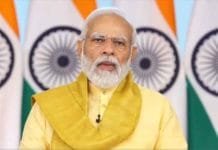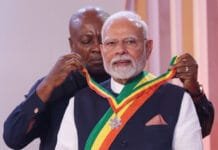Prime Minister Narendra Modi’s landmark visit to Namibia marks a pivotal moment in India-Namibia relations, opening new avenues in energy cooperation, defense trade, and critical minerals exploration. The diplomatic mission follows Modi’s two-day engagement in Brazil, underlining India’s renewed focus on strengthening strategic ties across the Global South.
Strategic Diplomacy: A Historic Visit After 27 Years
Prime Minister Modi’s visit is historically significant as it is the first-ever state visit to Namibia by an Indian PM in over two decades. Previously, only two Indian Prime Ministers had visited the Southern African nation. Modi’s presence reflects New Delhi’s intent to deepen bilateral engagements in sectors that are crucial for India’s economic and strategic interests.
Received with state honors, Modi is expected to hold high-level delegation talks with Namibian President Netumbo Nandi-Ndaitwah, who extended the invitation. The agenda is robust, covering energy security, defense collaboration, capacity building, and the conservation of biodiversity.
India Sets Sights on Namibian Uranium for Clean Energy Goals
One of the most critical components of this visit is India’s potential uranium imports from Namibia. As the fourth-largest uranium producer globally, Namibia holds strategic importance for India’s growing energy demands, especially as nuclear energy becomes central to India’s green transition.
India is currently ramping up its nuclear infrastructure with multiple reactors under construction and planned. Access to Namibian uranium would strengthen India’s energy security and reduce dependency on limited suppliers. According to India’s High Commissioner to Namibia, Rahul Srivastava, diplomatic discussions are underway to formalize this trade path and ensure long-term supply stability.
Oil and Gas Discoveries in Namibia Spark Indian Interest
Namibia’s newly discovered offshore oil and gas reserves have caught India’s attention. Energy giants like TotalEnergies and Shell have recently confirmed significant discoveries in the Orange Basin. India, with its burgeoning energy appetite, is keen to explore investment partnerships in Namibia’s oil sector.
Modi’s visit may result in Indian public sector companies such as ONGC Videsh and Indian Oil Corporation initiating talks for joint ventures or exploration rights. These engagements would align with India’s ambition to diversify energy import sources and invest in energy-rich, politically stable regions.
Critical Minerals: The Future of Technology and Industry
Namibia’s rich deposits of critical minerals—including lithium, rare earth elements, cobalt, and tantalum—are also under India’s radar. These minerals are essential for EV batteries, semiconductors, renewable energy systems, and advanced defense applications.
The Indian delegation is expected to propose long-term mining partnerships and encourage collaboration between Indian PSUs and Namibian authorities. This strategic move is vital as India seeks to reduce its dependency on dominant suppliers like China and expand its critical minerals security framework.
Defense Cooperation on the Rise
India’s growing defense exports find a promising partner in Namibia. The Namibian government has expressed keen interest in purchasing Indian defense equipment, including surveillance systems, armored vehicles, and communication technologies.
During the visit, both sides are likely to explore capacity-building programs through the Indian Technical and Economic Cooperation (ITEC) initiative. India could also offer military training programs and joint exercises, enhancing defense interoperability and regional security.
Project Cheetah 2: A Renewed Commitment to Wildlife Conservation
Another key element on the agenda is Project Cheetah 2. After the successful translocation of African cheetahs to India under the original Project Cheetah, discussions are now focusing on additional support and ecological collaboration.
High Commissioner Srivastava confirmed that India needs more cheetahs to establish a sustainable population. Namibia, being one of the primary donors of cheetahs, plays a vital role. Project Cheetah 2 will potentially include enhanced wildlife tracking systems, habitat sharing protocols, and collaborative biodiversity conservation efforts.
Parliamentary Address and Engagement with Indian Diaspora
Prime Minister Modi will also address the Namibian Parliament, a rare diplomatic gesture symbolizing respect and commitment to democratic values. His speech is expected to touch on shared historical struggles, emerging global challenges, and the vision for South-South cooperation.
Additionally, Modi will meet with the Indian diaspora in Namibia, further strengthening people-to-people ties. Indian-origin professionals and entrepreneurs in Namibia are involved in sectors ranging from pharmaceuticals and mining to IT and education.
Tribute to a Liberation Icon: Honoring Dr. Sam Nujoma
As part of his itinerary, Modi will pay homage to Namibia’s founding father, Dr. Sam Nujoma, by visiting his memorial. India had stood firmly by Namibia during its independence struggle, and this symbolic act reaffirms India’s historic solidarity and continued support for Namibia’s sovereignty and development.
Economic and Investment Prospects on the Horizon
Beyond energy and minerals, India is exploring trade and investment opportunities in sectors such as:
Renewable energy
Healthcare and pharmaceuticals
Information technology
Infrastructure development
Education and skill development
The Indian government may announce bilateral agreements and MoUs aimed at promoting business exchange and technology transfer. A bilateral investment protection agreement is also on the cards to provide legal safeguards for Indian investors.
Capacity Building: The Cornerstone of Bilateral Relations
Capacity building remains a core pillar of India-Namibia relations. Through programs like ITEC and ICCR scholarships, India has contributed to human resource development in Namibia. Prime Minister Modi is expected to expand these programs, offering new fellowships, training slots, and academic partnerships.
Namibia’s young population stands to benefit greatly from India’s digital education platforms, healthcare technologies, and skill enhancement schemes. Discussions may also include establishing an India-Namibia Innovation and Technology Hub to foster joint R&D.














